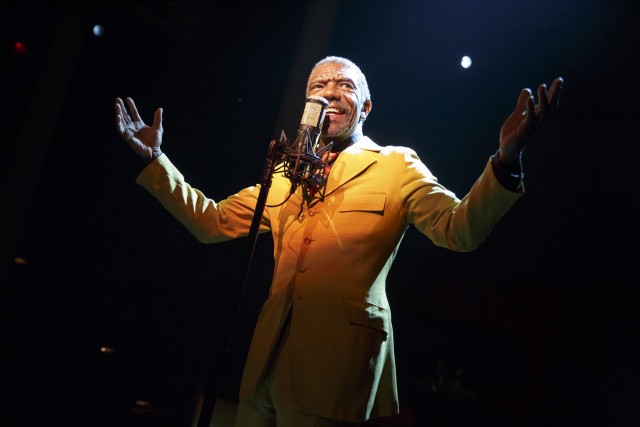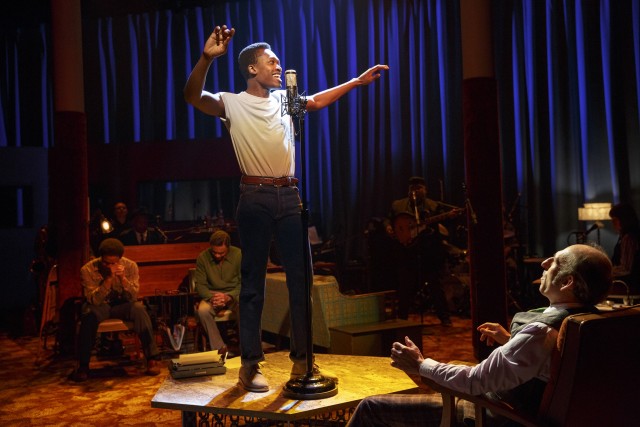
The legendary Papa Joe Roy (Vondie Curtis Hall) preaches in Bluntgomery, Alabama, in THE TOTAL BENT (photo by Joan Marcus)
Anspacher Theater, the Public Theater
425 Lafayette St. at Astor P.
Tuesday through Sunday through June 26, $45
212-539-8500
publictheater.org
On March 3, 1968, at Ebenezer Baptist Church in Atlanta, the Rev. Dr. Martin Luther King Jr. proclaimed, “In the final analysis, God does not judge us by the separate incidents or the separate mistakes that we make but by the total bent of our lives. In the final analysis, God knows that his children are weak and they are frail. In the final analysis, what God requires is that your heart is right. Salvation isn’t reaching the destination of absolute morality, but it’s being in the process and on the right road.” In Stew and Heidi Rodewald’s The Total Bent, the follow-up to their 2008 Broadway hit, Passing Strange, finding that right road is no easy journey. Set during the civil rights movement in 1960s “Bluntgomery, Alabama,” The Total Bent begins in a recording studio, where former R&B star and would-be faith healer Papa Joe Roy (Vondie Curtis Hall) is making what he hopes will be his crossover comeback album, with songs written by his son, Marty (Ato Blankson-Wood). “He forgave my sins / and then we made amends / And you know, that’s why, that’s why / that’s why he’s Jesus and you’re not, whitey,” Joe sings in the opening number. It immediately sets the audience, which is primarily Caucasian, on edge; Stew even makes note of the racial imbalance later in the show. Joe and Marty argue over the past and the future, the power of God and Satan, and the importance of protest. “My new songs rise to the beat of bus boycotter’s feet / Wanna take the struggle to church / And drag gospel into the street,” Marty says, while Joe points out his son’s propensity for high heels and Danny Kaye movies. And then Stew, playing guitar, chimes in, “Crossover: Black artists trying to win white audiences with a watered-down sound.” (The crack band, which includes Stew on guitar, Rodewald on bass, musical director Marty Beller on drums, John Blevins on trumpet, and Brad Mulholland on saxophone, hangs out at the back of Andrew Lieberman’s small, homey stage, relaxing on chairs, couches, and a church pew.) “Any real money in this protest shit?” Joe asks, to which Marty responds, “Jesus, Joe, it’s music to serve a liberation movement!” “So, no?” Joe replies. Joe then sings, “Shut up! / And get back on the bus / and take a back seat with a smile.” Joe’s legacy is displayed when two young men, Andrew (Jahi Kearse) and Abee (Curtis Wiley) — evoking a more contemporary kind of Amos and Andy — sneak into the recording studio twenty years later and almost melt in fear at the sight of Joe’s ghostly, glowing mic. “I can’t even bring myself to touch it,” Andrew says. “It’d be like touchin’ Tutankhamun’s wee-wee,” Abee adds, to which Andrew shoots back, “Must you always act a fool around white folks,” acknowledging the existence of the audience. (The show makes repeated references to itself as a musical theater production in front of a crowd, which gets particularly funny when a band member takes an actor’s line, much to the actor’s dismay, or when a character wonders aloud when the band had time to learn a song that was supposedly just created off the cuff.) Soon Andrew and Abee are backup singers for Marty, who has become an all-out rock star, strutting like the love child of Prince, James Brown, and Mick Jagger.

Marty (Ato Blankson-Wood) takes on his father during the civil rights era in THE TOTAL BENT (photo by Joan Marcus)
Passing Strange, which went from the Public Theater to Broadway to the big screen, made into a 2009 film by Spike Lee, was largely autobiographical. It would be interesting to know how much, if any, of The Total Bent, which has been extended at the Public’s Anspacher Theater through June 26, might be about Stew himself. Stew’s long-term band is called the Negro Problem, and, as a black man dealing with success in the white world, it could be easy to see his own inner conflicts in the characters of Joe and Marty. Regardless, however, The Total Bent is a lively, powerful show, with dynamite performances by Hall (Dreamgirls, Chicago Hope) and Blankson-Wood (Hair, Lysistrata Jones). David Cale provides comic relief as British music producer Byron Blackwell, while Kenny Brawner and Damian Lemar Hudson play a pair of deacons. Director Joanna Settle, who also helmed Stew and Rodewald’s Family Album, keeps everything more or less in line even as Stew’s book goes from esoteric to mystifying to impenetrable. Near the end of his March 3, 1968, speech, Dr. King said, “For you can stand up amid the storms. And I say it to you out of experience this morning, yes, I’ve seen the lightning flash. I’ve heard the thunder roll.” You can hear and see the thunder and lighting in The Total Bent, even if it doesn’t make complete sense. (Up next for Stew and Rodewald is Notes on a Native Song, a concert-novel tribute to James Baldwin.)